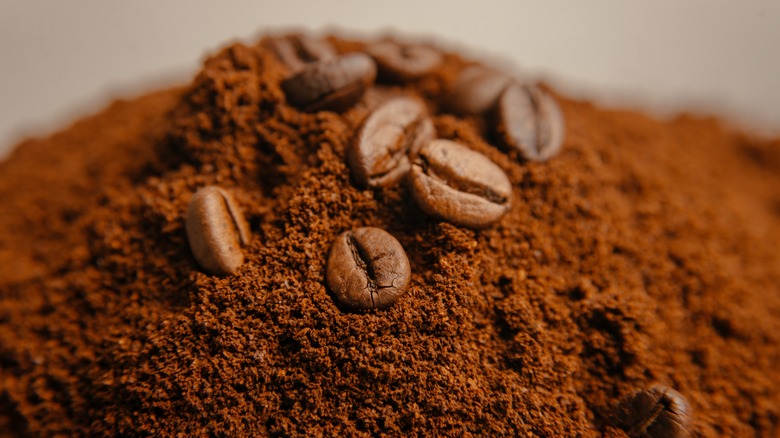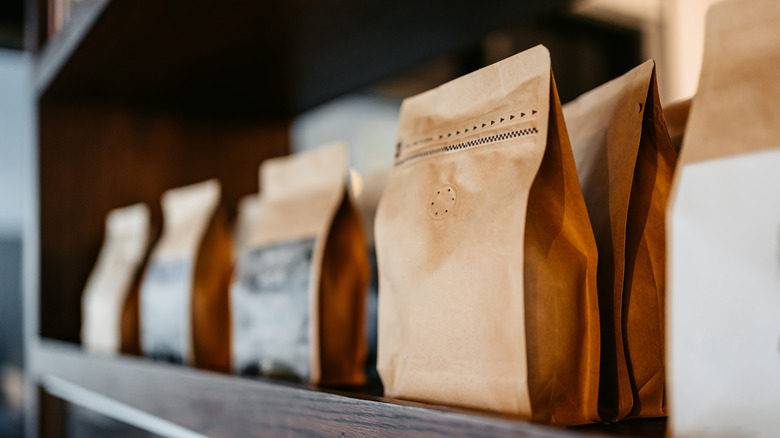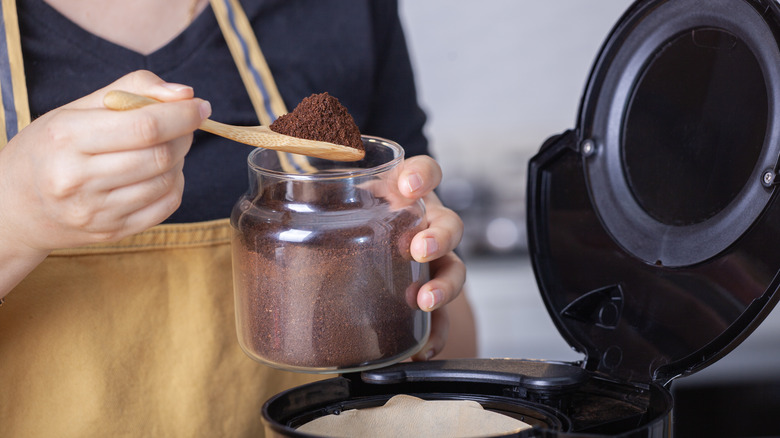The Creepy-Crawly Fact You Should Know About Pre-Ground Coffee Beans
While coffee fanatics may take the time to grind their coffee themselves before enjoying a morning cup of Joe, other people pick up bags of pre-ground coffee. It's more convenient and affordable, and still gives you that energy boost you're looking for on a Monday morning.
However, in a 2009 NPR interview, guest Douglas Emlen mentioned that pre-ground coffee might contain cockroaches — or at least ground-up parts of them. That's because cockroaches, who aren't picky eaters, may be attracted to piles of coffee in warehouses before it gets ground, packaged, and sent to supermarkets. The result, he claimed, is that your morning brew may have ground-up cockroaches in it. Upon closer inspection however, this may have been more hype than fact.
When it comes to other insects, the FDA sets guidelines for food quality and purity. Under those guidelines, they allow a small amount of defects in food products, and those defects include containing parts and larvae of other types of insects. And, while these are relatively small amounts, the upper limit, according to FDA guidance, is 10% — which may be more than you'd think and certainly more than you'd like in your favorite coffee beverage.
There's actually nothing to worry about
While this sounds like an unappetizing reason to stop buying pre-ground coffee, in terms of cockroaches, the NPR interview might have overstated the situation. Although cockroaches are a common pest in many types of businesses, according to Ja-Roy Pest Control – which monitors several major U.S. coffee companies – they have yet to see these insects in any coffee processing facilities.
What's more, although cockroaches may be drawn to the smell of coffee beans, these critters may not find the taste of coffee quite so appetizing. So it's unlikely that they're infesting coffee warehouses just to get to the beans — they're more likely to seek out other foodstuffs. Other bugs may not be such a concern either. The FDA has strict guidelines for pests that have to be kept out of food products (especially cockroaches, by the way). As a result, coffee manufacturers must adhere to laws and regulations that ensure these critters aren't enjoying your coffee before you do. And, although up to 9% of your coffee being contaminated by insects might sound like a lot, the FDA assures us that these quantities aren't harmful to your health.
Pests aren't the only reason to grind your own coffee beans
While the NPR cockroach anecdote may not be a cause to avoid pre-ground coffee, there are still other reasons you might want to stick to buying whole beans instead. For one thing, pre-ground coffee comes in one grind size. The ideal grind size for brewing the perfect cup of coffee varies depending on how you prep the drink. For instance, espresso calls for finely ground coffee, whereas a French press needs a coarse grind. When you use the wrong grind size, you can get a drink that's too weak or too strong.
Additionally, pre-ground coffee tends to be lower quality. For one thing, some brands of pre-ground coffee are made from beans that have been eaten by the coffee berry borer. These beans, although still consumable, don't meet the coffee standards needed to class the brew as specialty coffee, so they're sold as low-grade products instead. At the same time, pre-ground coffee loses flavor and aroma over time, which can lead to a less tasty cup when you brew it at home. So, while you may not need to worry about cockroaches in your coffee, you may find it worthwhile sticking to whole beans wherever you can for the tastiest cup of joe.


